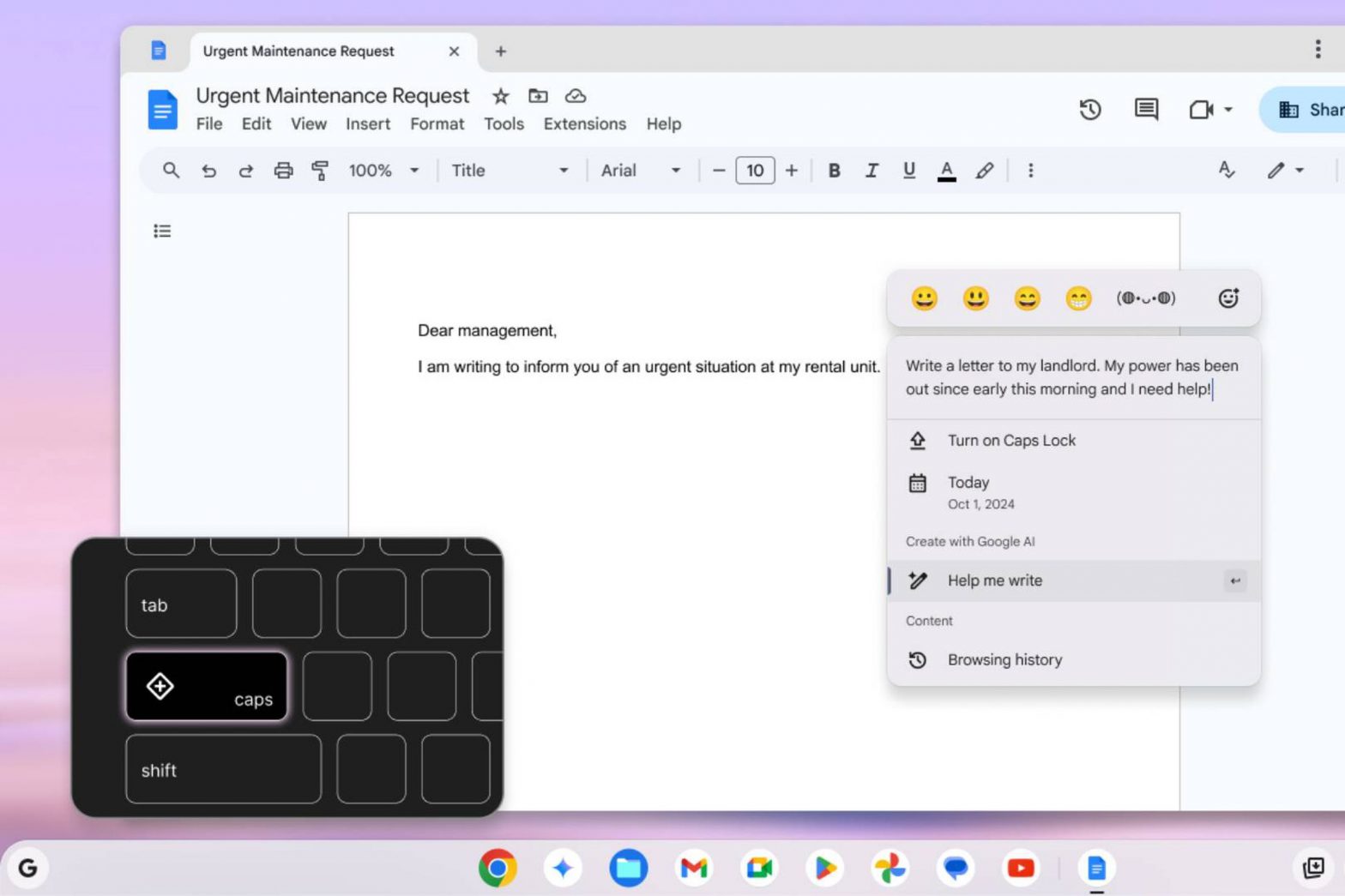/
The button debuts alongside two new Chromebooks from Samsung and Lenovo.
:format(webp)/cdn.vox-cdn.com/uploads/chorus_asset/file/25652213/Chromebook_Quick_Insert__1_.jpg)
Google is announcing a pair of new Chromebooks today — Samsung’s Galaxy Chromebook Plus and Lenovo’s Chromebook Duet 11 — and along with them, a brand-new button. Dubbed the Quick Insert button, it’s designed to give immediate access to some of Google’s latest AI features.
The new Quick Insert button will replace the search / launcher button on some Chromebooks going forward, starting with the Galaxy Chromebook Plus. Quick Insert is your one-stop shop for a host of new AI features: press it, and a menu pops up giving you quick access to features like “Help me write,” which can lend a helping hand with memos, emails, and eventually, AI image generation, according to John Maletis, VP of ChromeOS product, engineering, and UX.
The button is also meant to let you access information more quickly. It can pull up a list of recently visited websites so you can insert links, search through your photos, videos, docs, and spreadsheets in Google Drive, or pull up your favorite GIFs and emoji. Microsoft made a similar change earlier this year, placing a dedicated Copilot key on some laptops to offer quick access to Windows’ AI feature.
:format(webp)/cdn.vox-cdn.com/uploads/chorus_asset/file/25652214/Chromebook_Welcome_Recap.jpg)
Quick Insert joins a host of other AI features rolling out starting this month to Google’s premium Chromebook Plus lineup. There’s “Help me read,” which summarizes whatever you’re reading; Live Translate, which creates translated captions in real time for over 100 languages; and the Recorder app, which can create transcripts from lectures, interviews, or conversations. I saw the Recorder app in action during a demo and asked the presenter a few questions about the service. The app accurately displayed my words and identified us as separate speakers.
Welcome Recap, which is coming to all Chromebooks, might be the most interesting feature in the rollout. Once you power the system back on, it provides an overview of whatever you were doing before you logged out. Welcome Recap works across devices and gives suggestions such as reminders for “your next video call, quick access to a recently opened file, or a clickable suggestion to finish an article started on your Android or iOS phone.” If you tend to be a tab hoarder like myself, this feature can come in handy.
:format(webp)/cdn.vox-cdn.com/uploads/chorus_asset/file/25652216/Samsung_Chromebook_Plus_display.jpg)
:format(webp)/cdn.vox-cdn.com/uploads/chorus_asset/file/25652217/Samsung_Galaxy_Chromebook_lid.jpg)
Samsung’s Galaxy Chromebook Plus is Google’s first showcase for these new features. The notebook’s grayish-blue all-aluminum chassis will definitely turn heads. At 2.58 pounds and 0.46 inches, the laptop bears the distinction of being the lightest and thinnest Chromebook either company has launched.
The Chromebook Plus has a 15.6-inch OLED display that looked stunning when I got to see it in person last week, and it’s paired with a pretty good keyboard, complete with a full numpad. But if you’re looking for a powerhouse, this isn’t it. The Chromebook Plus has an Intel Core i3 100U Raptor Lake Refresh processor with 8GB of RAM and 256GB of onboard storage. For battery life, it’s estimated to last 13 hours on a charge.
:format(webp)/cdn.vox-cdn.com/uploads/chorus_asset/file/25652219/Chromebook_Duet_11_Front.jpg)
:format(webp)/cdn.vox-cdn.com/uploads/chorus_asset/file/25652220/Lenovo_Chromebook_Duet_left_side.jpg)
Although it lacks the Quick Insert button, Lenovo’s Chromebook Duet 11 can still access all of the new ChromeOS features. A refresh of the popular detachable that launched way back in 2020, the 2024 version retains the portability and versatility of the previous models, with updated internals. When you’re not using the machine in laptop mode, the magnetic keyboard detaches, so the Duet 11 can be used as a tablet. Or you can fold the rear cover and use it as a kickstand to stand it up vertically or horizontally.
Lenovo is touting the 10.9-inch, 1920 x 1200 touchscreen’s advanced palm rejection. It’s a great way to use the USI Pen 2 that’s included in the bundle. The stylus attaches magnetically to the back.
Sporting a MediaTek Kompanio 838 CPU with 8GB of RAM and 128GB of onboard storage, the Duet is good for taking notes and other light productivity and multimedia tasks. It has two webcams: an 8MP in the back and a 5MP front-facing shooter. For battery life, Lenovo clocks an estimated 12 hours on a charge. The detachable also has an education edition that places the tablet portion in a durable case to protect against inadvertent drops.
Both laptops will be available this month. The Duet 11 will start at $399, while the more premium Galaxy Chromebook Plus starts at $699.
Photography by Sherri Smith
